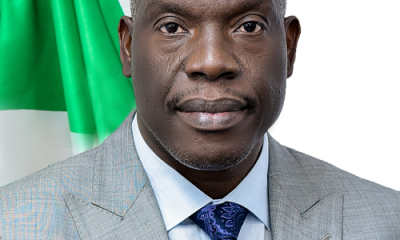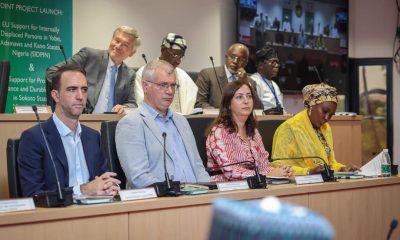EDUCATION
Saudi Universities Welcome Nigerian Students Of All Faiths—Prof Daajim

Nigerians, both Muslim and non-Muslim, are encouraged to pursue higher education at universities in Saudi Arabia.
Speaking to journalists in Abuja on Monday at the opening of the Forum of Saudi Arabia Universities Alumni in Nigeria and Neighbouring countries, Professor Saad Daajim, Vice President for Educational and Academic Affairs at King Khalid University, stated that over 850 Nigerian students are currently enrolled in various Saudi Arabian universities. He also noted that more than 3,200 Nigerians have graduated from these institutions in the past decade.
The forum, themed “Alumni of Saudi Universities in the Federal Republic of Nigeria and Surrounding Countries and Their Impact on Sustainable Development,” provided a platform for discussion and networking.
Professor Daajim emphasised that in Arabia, we currently have over 850 students from Nigeria studying at our universities. In the last decade alone, we have seen over 3,200 graduates from Nigeria.”
He affirmed Saudi Arabia’s openness to admitting more Nigerian students, promising a favourable rate. “We are proud to welcome more Nigerian students to our universities across various disciplines, including education, engineering, science, Arabic language, religious studies, and the medical sector. We hope to offer a good acceptance rate to Nigerian applicants, as they represent a significant portion of the African student population,” he added.
Professor Daajim also highlighted the availability of scholarships, regardless of religious affiliation. “Our admission policies, including scholarship opportunities, are accessible to all,” he stated. “King Abdullah University for Science and Technology, for example, offers scholarships to both Muslim and non-Muslim students. Similarly, King Fahd University for Mineral and Petroleum employs and accepts students from all cultures, religions, and continents.”
The forum, according to Professor Daajim, aims to foster communication with alumni of Saudi universities and assess their impact on their communities. “We have found them to be very active, and we expect that upon returning to Nigeria, they will contribute to sustainable development, both in their personal lives and within the country,” he explained.
Regarding career prospects for Nigerian graduates in Saudi Arabia, Professor Daajim noted that opportunities exist for pursuing advanced degrees and potential employment. “After graduating from a Saudi university, students can continue their studies at the Master’s or PhD level. Qualified graduates may also be hired by the university as professors.”
Dr. Suwaiba Said Ahmad, Minister of State for Education, commended Saudi Arabia for its long-standing commitment to educational cooperation and cultural exchange with Nigeria in her opening remarks.
Dr. Ahmad stated, “Such partnerships enrich our human capital and strengthen bilateral ties for mutual benefit. As we celebrate this gathering, I encourage the alumni to continue serving as ambassadors of knowledge, peace, and development.”
She further added, “Your role in mentoring young Nigerians, promoting intercultural understanding, and contributing to national development is invaluable. The Federal Ministry of Education will continue to support initiatives that leverage alumni networks for national advancement, educational progress, and sustainable nation-building.”
Dr. Ahmad also acknowledged the significant contributions of Nigerian alumni of Saudi universities to the country’s growth, peace, education, culture, and overall development.
“Beyond academic achievements, you embody the bond of friendship, cooperation, and shared values between Nigeria and the Kingdom of Saudi Arabia. Education, as we know, is the foundation of progress,” she said. “The training and exposure you gained in Saudi institutions have not only equipped you with knowledge but also instilled in you discipline, a global perspective, and a strong sense of purpose. These qualities are crucial to advancing Nigeria’s quest for inclusive and sustainable development. Indeed, many of you have become respected scholars, professionals, entrepreneurs, community leaders, and public servants whose influence continues to positively shape our society.”
Dr. Mohamed Munir Ilyas, Secretary of the Alumni and a graduate of the Islamic University of Medina, stated that since returning home, he has been actively promoting peaceful coexistence between the major religious groups in Nigeria.
He emphasized, “Of course, development is difficult without peace. We have been encouraging our members to be law-abiding citizens, peacemakers, peace builders, and peacekeepers. We also strive to make an impact academically, morally, and even in terms of economic well-being.”
-
CRIME4 years ago
PSC Dismisses DCP Abba Kyari, To Be Prosecuted Over Alleged $1.1m Fraud
-
FEATURED4 years ago
2022 Will Brighten Possibility Of Osinbajo Presidency, Says TPP
-
FEATURED2 years ago
Buhari’s Ministers, CEOs Should Be Held Accountable Along With Emefiele, Says Timi Frank
-
BUSINESS & ECONOMY2 years ago
Oyedemi Reigns As 2023’s Real Estate Humanitarian Of The Year
-
SPORTS2 years ago
BREAKING: Jürgen Klopp Quits Liverpool As Manager At End Of Season
-
SPORTS2 years ago
Could Liverpool Afford Kylian Mbappe For €200 million? Wages, Transfer Fee
-
ENTERTAINMENT2 years ago
Veteran Nigerian Musician, Basil Akalonu Dies At 72
-
FEATURED2 years ago
Tribunal Judgement: Peter Obi Warns Of Vanishing Electoral Jurisprudence, Heads To Supreme Court
-
BUSINESS & ECONOMY2 years ago
Oyedemi Bags ‘Next Bulls Award’ As BusinessDay Celebrates Top 25 CEOs/ Business Leaders
-
FEATURED3 years ago
2023 Presidency: South East PDP Aspirants Unite, Demand Party Ticket For Zone



































